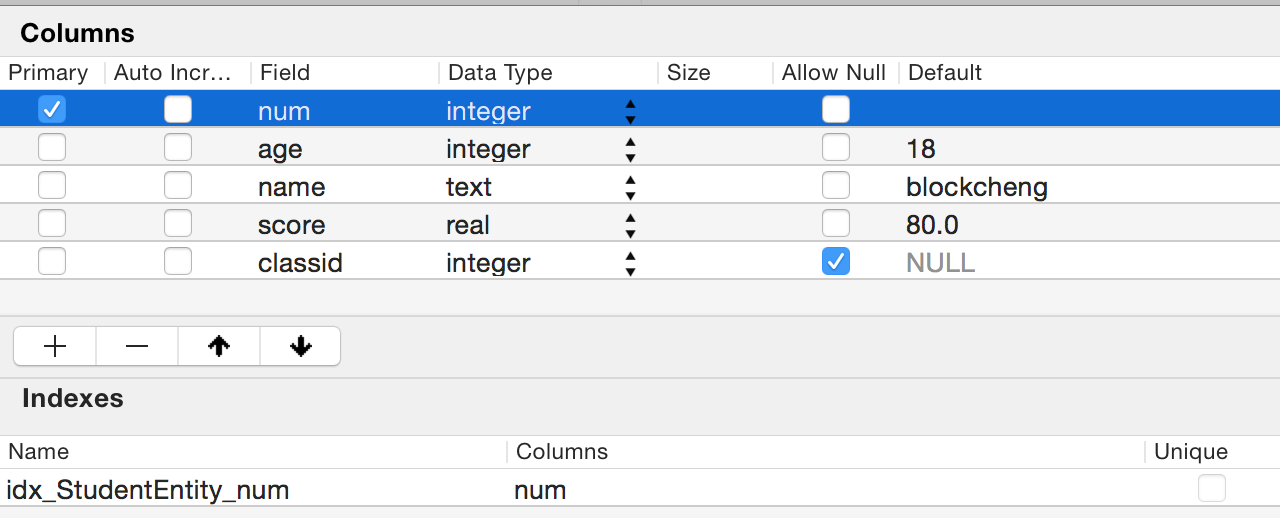版权声明:本文为博主原创文章,未经博主允许不得转载。
本次利用一个常见的数据库关系例子说明本ORM的基本需求。
班级、学生 这一对表,关系为1对多,班级表主键id,学生表主键num、外键班级id。
表结构如下:
班级表class结构

学生student表:

程序中对应的实体类分别是:班级实体(ClassEntity),学生实体(Student)
其基本objective-c类结构如下:
@interface ClassEntity : NSObject @property (nonatomic,assign)NSInteger classId; @property (nonatomic,copy)NSString* className; @end
@interface StudentEntity : NSObject @property (nonatomic,assign)NSInteger classId; @property (nonatomic,assign)int age; @property (nonatomic,assign)float score; @property (nonatomic,assign)NSInteger studentNum; @property (nonatomic,copy)NSString* studentName; @end
在这个orm中,我预期的效果是:
0、如果存在内置的数据库,我只需要传入实体类,就能建立映射,直接操作。
1、如果不存在内置数据库,我只需要传入实体类,就能自动建好数据库和实体数据库间的映射。
2、支持主外键,支持索引语句。
input:
@[ [ClassEntity class],[StudentEntity class]]
output:
CREATE TABLE class ( id integer PRIMARY KEY AUTOINCREMENT NOT NULL, name text NOT NULL DEFAULT(‘Software01‘) );
【数据库的表名可以任意配置,学生表名可以为StudentEntity】
CREATE TABLE ‘StudentEntity‘ ( ‘num‘ INTEGER PRIMARY KEY NOT NULL , ‘age‘ INTEGER NOT NULL DEFAULT ‘18‘ , ‘name‘ TEXT NOT NULL DEFAULT ‘blockcheng‘ , ‘score‘ REAL NOT NULL DEFAULT ‘80.0‘ , ‘classid‘ INTEGER, CONSTRAINT ‘Student_class‘ FOREIGN KEY (‘classid‘) REFERENCES ‘class‘(‘id‘) ); CREATE INDEX idx_StudentEntity_num ON StudentEntity (num);
此条的预期是这样的: 传入一个实体对象,自动生成sql,然后经由fmdb,存入sqlite。
input:
ClassEntity* classeEntity = [ClassEntity new]; classeEntity.className = @"Software02"; classeEntity.classId = 2;
StudentEntity* student = [StudentEntity new]; student.age = 12; student.score = 80; student.classId = 2; student.studentNum = 421125; student.studentName = @"BlockCheng";
output:
INSERT INTO class ( ‘id‘,‘name‘) VALUES (:id ,:name )
args:{
id = 2;
name = "Software02";
}
INSERT INTO StudentEntity ( ‘age‘,‘name‘,‘num‘,‘score‘,‘classid‘) VALUES (:age ,:name ,:num ,:score ,:classid )
args:{
age = 12;
classid = 2;
name = "BlockCheng";
num = 421125;
score = 80;
}
传入一个sqlite中已存在的实体,自动生成update语句,基于主键的条件更新。
input:
StudentEntity* student = [StudentEntity new]; student.age = 12; student.score = 80; student.classId = 2; student.studentNum = 421125; student.studentName = @"BlockCheng_update";
output:
UPDATE StudentEntity SET age = :age,name = :name,num = :num,score = :score,classid = :classid WHERE num =‘421225‘
args:{
age = 12;
classid = 2;
name = "BlockCheng_update";
num = 421225;
score = 80;
}
根据传入的查询条件,生成sql:
input:
.entityClass = [StudentEntity class]; .propertyArray = @[@"age",@"classId",@"score",@"studentName",@"studentNum"]; .selection = @"classId = ? and studentNum=?"; .selectionArgs = @[@1,@421128]; .orderBy = @" studentNum asc";
output:
SELECT age, classid, score, name, num FROM StudentEntity WHERE classid = ? and num=? ORDER BY num asc arg:( 1, 421128 )
根据传入的类和条件,生成delete语句。
input:
.entityClass = [StudentEntity class]; .selection = @"studentNum=?"; .selectionArgs = @[@421138];
output:
DELETE FROM StudentEntity WHERE num =‘421138‘
update input:
.entityClass = [StudentEntity class]; .selection = @"studentNum=?"; .selectionArgs = @[@421128]; .update= @"studentName=?" .upateArgs=@[@"update_condition"];
update output:
UPDATE StudentEntity SET name=? WHERE num=? args:( "update_condition", 421125 )
delete input:
.entityClass = [StudentEntity class]; .selection = @"studentNum < ?"; .selectionArgs = @[@421135];
delete output:
DELETE FROM StudentEntity WHERE num < ? args:( 421135 )
如何利用runtime+fmdb,实现上面提到的效果?
0、怎么去抽象和封装,达到满足需求的基本结构类,便于日后使用?
1、怎么明了地处理实体和数据库表间的映射关系,简单易用的语法如何设计?
3、到底该提供哪些基础通用功能?
(2)预期+思考【利用objective-c的runtime特性,结合FMDB实现轻量级的ORM】
原文:http://my.oschina.net/chengliqun/blog/504233